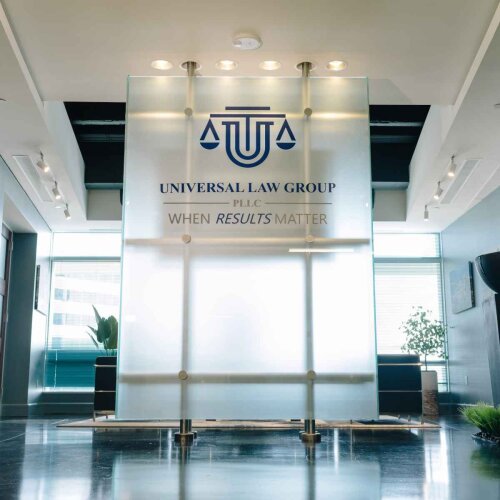Best Faith-Based Law Lawyers in Houston
Share your needs with us, get contacted by law firms.
Free. Takes 2 min.
List of the best lawyers in Houston, United States
About Faith-Based Law in Houston, United States
Faith-Based Law refers to the intersection of legal practice and religious laws within the United States legal framework. In Houston, which boasts a diverse population with various religious communities, Faith-Based Law can involve addressing legal matters that are impacted by religious beliefs, practices, or organizational structures. This field may cover a range of legal issues, such as marriage, divorce, estate planning, employment within faith-based organizations, and more, all while considering the relevant religious doctrines aligned with federal and state laws.
Why You May Need a Lawyer
Individuals or organizations may seek legal assistance in Faith-Based Law for several reasons:
- Religious Divorce: Navigating divorce proceedings that require adherence to both civil and religious laws, such as obtaining a religious annulment.
- Employment Law: Addressing employment disputes or contracts within religious organizations, balancing secular law and religious tenets.
- Estate Planning: Structuring wills or trusts in a manner that aligns with specific religious doctrines regarding inheritance.
- Non-Profit Law: Assisting religious non-profits in legal matters, including compliance with tax-exemption requirements.
- First Amendment Rights: Protecting the right to free exercise of religion or determining the limits of those rights in various contexts.
Local Laws Overview
Houston, like the rest of Texas, adheres to both state and federal laws that can impact Faith-Based legal matters:
- Texas Family Code: Governs marriage and divorce, with certain accommodations for religious beliefs.
- Texas Religious Freedom Restoration Act (TRFRA): Protects individuals and entities from laws that could substantially burden their free exercise of religion.
- Establishment Clause: Part of the First Amendment, influencing how local ordinances address religious activities.
- Non-Profit Regulations: State laws affecting how religious organizations operate and maintain tax-exempt status.
Frequently Asked Questions
What is the relationship between Faith-Based Law and state law?
Faith-Based Law must operate within the constraints of state and federal law, meaning religious practices are often examined within the boundaries defined by civil statutes.
How do Houston courts handle religious divorces?
Courts require all divorces to comply with state law, but accommodations can be made for religious practices, such as the incorporation of nuptial agreements compliant with religious law, where applicable.
Can religious organizations employ staff based on religious criteria?
Yes, but they must comply with non-discrimination laws to a certain extent. The ministerial exception allows some religious organizations to hire based on religious beliefs for roles integral to religious functions.
How does Faith-Based Law address disputes involving religious doctrines?
Legal professionals may act as mediators, facilitating agreements that respect religious beliefs while fulfilling the requirements of civil law.
What protections exist for religious institutions under Houston laws?
Various protections exist, such as exemptions from certain taxes and the ability to partake in certain First Amendment protections.
How do I ensure my will complies with religious laws in Houston?
Consult with a lawyer experienced in both estate planning and religious laws to ensure that your will is structured to meet both legal and religious requirements.
What is the process for starting a religious non-profit in Houston?
You need to comply with both state and federal non-profit laws, including registering your organization and applying for 501(c)(3) status if applicable.
How are religious dietary laws accommodated in public institutions?
While institutions may not be required to accommodate all religious dietary laws, many offer alternatives or special meals to respect religious practices.
Is there legal protection for students in religious schools?
Yes, but the protections can vary based on the intersection of religious and educational laws, including rights to free exercise and non-discrimination.
Are faith-based healthcare practices legally recognized?
They can be recognized if they comply with overarching healthcare laws, including licensing and safety standards, while certain exemptions may apply.
Additional Resources
For further information or assistance, consider reaching out to these Houston-based resources:
- The Texas Religious Freedom Restoration Act (TRFRA) resources
- Houston Bar Association - Offers referral services and legal resources
- American Civil Liberties Union (ACLU) of Texas - Advocates for religious freedoms and rights
- Local offices of religious organizations with legal advisory wings
Next Steps
If you believe you need legal assistance in Faith-Based Law, begin by:
- Researching attorneys or law firms in Houston that specialize in Faith-Based or religious law.
- Setting up consultations to discuss your specific needs and evaluate potential legal strategies.
- Gathering relevant documents or information related to your legal issue, including religious texts if applicable.
- Staying informed about the intersections of religious laws and civil statutes to better advocate for your needs.
Lawzana helps you find the best lawyers and law firms in Houston through a curated and pre-screened list of qualified legal professionals. Our platform offers rankings and detailed profiles of attorneys and law firms, allowing you to compare based on practice areas, including Faith-Based Law, experience, and client feedback.
Each profile includes a description of the firm's areas of practice, client reviews, team members and partners, year of establishment, spoken languages, office locations, contact information, social media presence, and any published articles or resources. Most firms on our platform speak English and are experienced in both local and international legal matters.
Get a quote from top-rated law firms in Houston, United States — quickly, securely, and without unnecessary hassle.
Disclaimer:
The information provided on this page is for general informational purposes only and does not constitute legal advice. While we strive to ensure the accuracy and relevance of the content, legal information may change over time, and interpretations of the law can vary. You should always consult with a qualified legal professional for advice specific to your situation.
We disclaim all liability for actions taken or not taken based on the content of this page. If you believe any information is incorrect or outdated, please contact us, and we will review and update it where appropriate.










